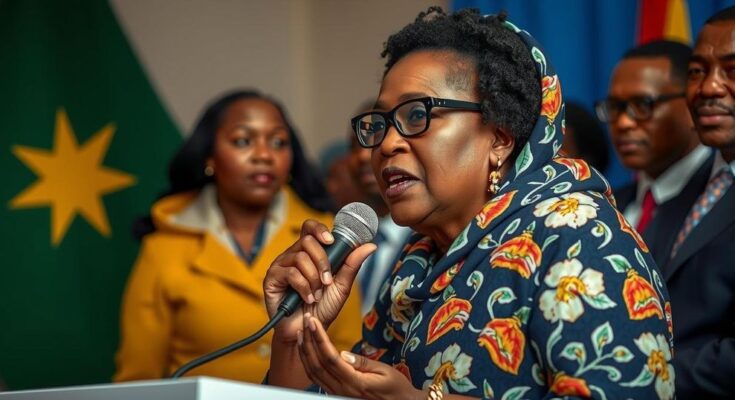Netumbo Nandi-Ndaitwah has been elected as Namibia’s first female president, winning 57% of the vote amidst an election marred by technical irregularities. Her victory strengthens SWAPO’s 34-year hold on power since independence. Opposition parties contest the legitimacy of the results, citing violations and calling for legal challenges. Nandi-Ndaitwah’s leadership comes at a time of significant youth discontent regarding unemployment and inequality.
Namibia has made history by electing Netumbo Nandi-Ndaitwah as its first female president. The 72-year-old, representing the South West Africa People’s Organisation (SWAPO), garnered 57 percent of the votes, surpassing predictions that suggested she might be forced into a run-off election. Following the official announcement by the electoral commission, Nandi-Ndaitwah declared, “The Namibian nation has voted for peace and stability.” This victory not only highlights her personal achievement but also reinforces SWAPO’s grip on power, which it has held since the country’s independence in 1990.
Despite her significant win, the election was marred by controversy. Opposition parties, including the Independent Patriots for Change (IPC), have refuted the election results, citing numerous irregularities such as ballot paper shortages, which led to extended voting periods. Long wait times prompted many voters to abandon their quest to cast ballots. IPC candidate Panduleni Itula decried the situation, asserting, “The rule of law has been grossly violated and we cannot call these elections by any means or measure as free, fair and legitimate.”
Following her election, Nandi-Ndaitwah pledged to address the concerns of the electorate, particularly the discontent among young voters regarding high unemployment rates and lingering societal inequalities. Her political career is noteworthy, having begun in the underground independence movement of the 1970s. She has served in various ministerial positions since joining Parliament upon independence in 1990. As Namibia’s first female president, she faces the dual challenge of upholding her party’s legacy while navigating the demands of a more critical electorate.
The election of Netumbo Nandi-Ndaitwah marks a significant milestone in Namibia’s political landscape, as she becomes the first woman to assume the presidency. Her victory is particularly consequential as it solidifies SWAPO’s long-standing dominance in Namibian politics, which has remained largely unchallenged since independence. Amidst severe criticisms and claims of electoral malpractice, the election results reflect a broader sentiment of discontent among citizens, particularly among the youth who feel marginalized by high unemployment and socio-economic disparities. Understanding the historical context of SWAPO’s governance is crucial in assessing the current political climate preceding Nandi-Ndaitwah’s presidency.
The election of Netumbo Nandi-Ndaitwah not only introduces a historic figure into Namibian politics but also poses significant challenges as she navigates the ramifications of widespread allegations of electoral misconduct and public dissatisfaction. Her commitment to addressing the pressing issues facing the nation, particularly for young voters, will be closely scrutinized as she embarks on her tenure as president. As opposition voices grow louder, Nandi-Ndaitwah’s leadership will be pivotal in determining the future stability and democracy of Namibia.
Original Source: www.aljazeera.com




